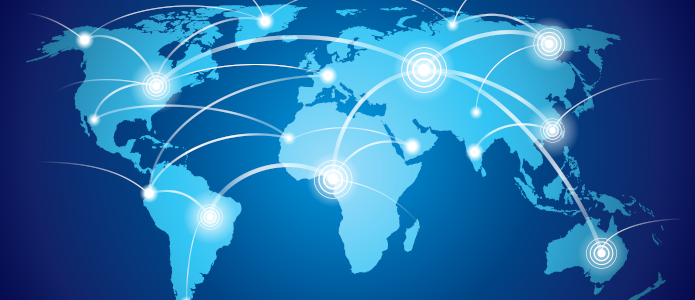Business-stats GVC
About Global Value Chains
The global economy is increasingly structured around production processes of a final product that are fragmented across national economies, wherein intermediate goods and associated services may cross national borders several times before they are assembled and sold as a final product. Such global value chains (GVCs) account for a sizable share of international trade, global gross domestic product and employment in both developed and developing countries. The evolution of GVCs in diverse industries, such as agrifood, textiles and apparel, automotive, electronics, tourism and business services, has significant implications for cross-border trade, production and employment arrangements. GVCs link firms, workers and consumers around the world and often provide a stepping stone for firms and workers in developing countries to participate in the global economy. For many countries, especially low-income countries, the ability to effectively integrate into GVCs, and eventually upgrade their position therein, is a vital condition for economic and social development.
The new and diverse production arrangements organized by multinational enterprises through GVCs have increased the complexity of compiling economic statistics, as it is more difficult to break down production activities on a country-by-country basis. The measurement challenges include the choice of the statistical unit, the classification of enterprises and products involved in GVCs, the implementation of the principle of economic control and ownership, and the recording of domestic and cross-border transactions and positions in national accounts and balance of payments statistics.
Guidelines on Accounting for GVCs: GVC satellite accounts and integrated business Statistics
The Guidelines on Accounting for Global Value Chains: GVC Satellite Accounts and Integrated Business Statistics were prepared by the Expert Group on International Trade and Economic Globalization Statistics. The Expert Group was established by the United Nations Statistical Commission in 2015 to address the challenges that globalization and emerging complex production arrangements pose to compiling macroeconomic and business statistics, including the supporting business registers.
These Guidelines provide a national perspective on globalization on the basis of a GVC accounting framework that describes industry-specific GVCs in a multi-country supply chain of goods, services and institutional arrangements. Doing so allows for an integrated presentation of production, income, assets and liabilities by partner country for those GVC industries that play a significant role in the national economy, resulting in GVC-specific, multi-country supply and use tables and related institutional sector accounts.
These accounts rely on a framework for integrated business, trade and investment statistics, which is based on a global enterprise perspective, with the aim of better understanding the business models and business accounting schemes of global enterprises in their day-to-day activities. Thus, the Guidelines further elaborate on the concepts of business lines and business functions and profiling large multinational enterprises. They emphasize the importance of statistical business registers and global registers and resolving data inconsistencies in basic economic statistics.
The Guidelines are a result of extensive consultations with the Expert Group on International Trade and Globalization Statistics, through both virtual fora and face-to-face meetings. The Guidelines were circulated for a global consultation with national statistical offices and relevant international organizations in February 2019. The draft Guidelines were then submitted to the United Nations Statistical Commission in March 2019, together with the results of the global consultation. The United Nations Statistical Commission took note of the Guidelines and encouraged countries to implement the global value chain satellite accounts.
Expert Group on Interrnational Trade and Economic Globalization Statistics
The Expert Group on International Trade and Economic Globalization Statistics was established by the United Nations Statistical Commission in 2015 to prepare a handbook on a system of extended national accounts and integrated business statistics to address the challenges that globalization and emerging complex production arrangements pose to compiling macroeconomic and business statistics, including the supporting business registers (see E/2015/24, chap. I.C, decision 46/107).
The work initiated in 2013 during the 44th session of the United Nations Statistical Commission, with the review (Report of the Secretary-General, E/CN.3/2013/7) of the work undertaken in the field of international trade statistics, on topics such as integrated economic statistics, linking trade and business statistics, trade and global production, trade in value added, statistics of multinational enterprises and foreign direct investment. This report highlighted the growing concerns regarding the limitations of current trade and business statistics to inform the policy debate. While there were many international task teams working on these measurement problems in various areas of international trade and economic globalization, the United Nations Statistical Commission recognized (see Decision 44/106 in E/2013/24) the need for an overarching framework and systematic coordination and agreed to the creation of a "Friends of the Chair" group tasked with preparing a concept paper on the scope and content of the framework and on the appropriate mechanism for coordination, which resulted in the decision of the United Nations Statistical Commission (see E/2015/24, chap. I.C, decision 46/107) to establish the Expert Group on International Trade and Economic Globalization Statistics.
The Expert Group was chaired by Michael Connolly of the Central Statistics Office of Ireland and included the following members: Andre Loranger (Statistics Canada), Joao Cardoso (Instituto Nacional de Estatistica of Cape Verde), Huaju Li (National Bureau of Statistics of China), Lilian Navas (National Administrative Department of Statistics of Colombia), Hugo Mora (Central Bank of Costa Rica), Peter Bøegh Nielsen (Statistics Denmark), Shri Sudipta Bhattacharya (Directorate General of Commercial Intelligence and Statistics of India), Stefano Menghinello (Italian National Institute of Statistics), Hyun Jeong Hong (Statistics Korea), Arturo Blancas (National Institute of Statistics and Geography of Mexico), Gerardo Durand (National Institute of Statistics and Geography of Mexico), Houssein Ouljour (Office des Changes of Morocco), Martin Luppes (Statistics Netherlands), George Djolov (Statistics South Africa), Wirongrong Niamthanom (Ministry of Commerce of Thailand), Bright Richard Kimuli (Uganda Bureau of Statistics), Sanjiv Mahajan (Office for National Statistics of the United Kingdom), Michael Hardie (Office for National Statistics of the United Kingdom), Erich Strassner (Bureau of Economic Analysis of the United States of America), Tjeerd Jellema (European Central Bank), Isabelle Remond-Tiedrez (Eurostat), Jose Rueda Cantuche (EU Commission), Daria Taglioni (IFC), Manpreet Singh (ILO), Cornelia Hammer (IMF), Thomas Alexander (IMF), Nadim Ahmad (OECD), Elena Borushko (Eurasian Economic Commission), Deborah Winkler (The World Bank), Melise Jaud (The World Bank), Ivo Havinga (UNSD), Ronald Jansen (UNSD), Nancy Snyder (UNSD), Andreas Maurer (WTO), Timothy Sturgeon (Massachusetts Institute of Technology Industrial Performance Center), Gary Gereffi and Stacey Frederick (Duke Center on Globalization, Governance & Competitiveness), and Steve Landefeld (UNSD consultant).
Meetings of the Expert Group on International Trade and Economic Globalization Statistics
- Fourth Meeting of the Expert Group on International Trade and Economic Globalization Statistics, Rome, Italy, 7 - 9 May 2018
- Third Meeting of the Expert Group on International Trade and Economic Globalization Statistics, Luxembourg, 6 - 8 June 2017
- Second Meeting of the Expert Group on International Trade and Economic Globalization Statistics, New York, USA, 29 Nov - 1 Dec 2016
- First Meeting of the Expert Group on International Trade and Economic Globalization Statistics, New York, USA, 26-28 January 2016
- International Conference on Measurement of Trade and Economic Globalization, Aguascalientes, Mexico, 29 September - 1 October 2014
Reports to The UN Statistical Commission
Topics
Events and Workshops
- Global Assessment on Statistical Business Registers 2025
- Global Assessment on the Use of Unique Identifiers for Businesses
- Regional course on Statistical Business Registers (Japan, March 2024)
- Regional Workshop on Statistical Business Registers and Industrial Classifications (Jordan, June 2024)



